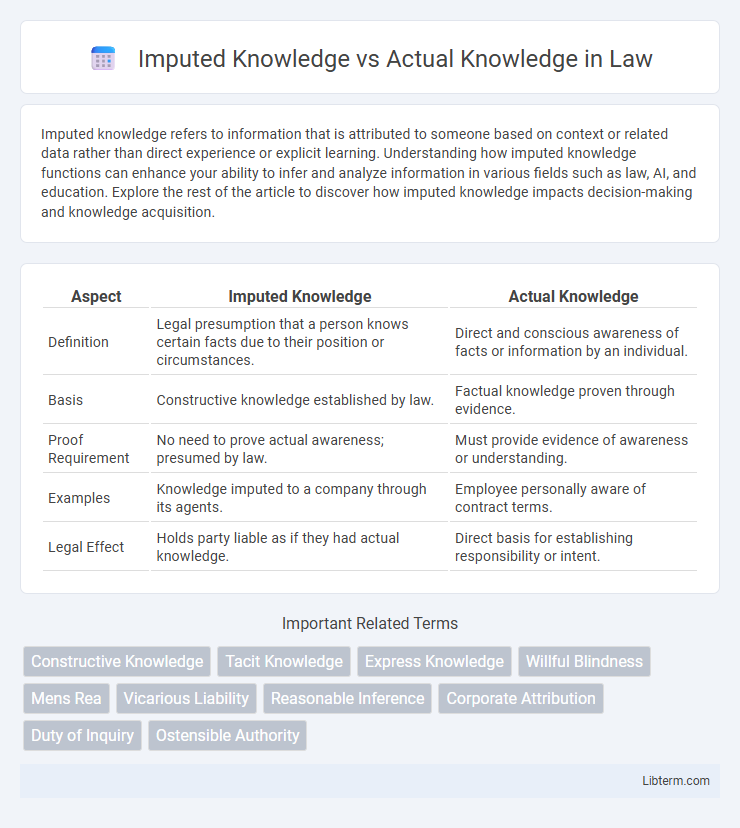Imputed knowledge refers to information that is attributed to someone based on context or related data rather than direct experience or explicit learning. Understanding how imputed knowledge functions can enhance your ability to infer and analyze information in various fields such as law, AI, and education. Explore the rest of the article to discover how imputed knowledge impacts decision-making and knowledge acquisition.
Table of Comparison
| Aspect | Imputed Knowledge | Actual Knowledge |
|---|---|---|
| Definition | Legal presumption that a person knows certain facts due to their position or circumstances. | Direct and conscious awareness of facts or information by an individual. |
| Basis | Constructive knowledge established by law. | Factual knowledge proven through evidence. |
| Proof Requirement | No need to prove actual awareness; presumed by law. | Must provide evidence of awareness or understanding. |
| Examples | Knowledge imputed to a company through its agents. | Employee personally aware of contract terms. |
| Legal Effect | Holds party liable as if they had actual knowledge. | Direct basis for establishing responsibility or intent. |
Understanding the Concept of Knowledge in Law
Imputed knowledge refers to information the law presumes a person possesses, regardless of their actual awareness, often attributed through relationships or circumstances. Actual knowledge involves direct, conscious awareness of relevant facts or circumstances by the individual. Understanding this distinction is crucial in legal contexts as it affects liability, responsibility, and the application of legal standards in cases such as fraud, negligence, or contractual obligations.
Defining Imputed Knowledge
Imputed knowledge refers to information presumed to be known by an individual or entity based on circumstances, roles, or legal standards rather than actual awareness or direct possession of facts. It is often used in legal contexts where responsibility or knowledge is assigned regardless of personal awareness, such as in cases of corporate liability or fiduciary duties. Distinguishing imputed knowledge from actual knowledge is critical for determining accountability and intent within regulatory and compliance frameworks.
What Is Actual Knowledge?
Actual knowledge refers to the concrete awareness or understanding a person has gained through direct experience, observation, or factual information. It involves explicit, verifiable facts and skills that an individual can demonstrate or apply in real situations. Unlike imputed knowledge, which is assumed or inferred based on circumstances or associations, actual knowledge requires evidence of conscious recognition or comprehension.
Key Differences Between Imputed and Actual Knowledge
Imputed knowledge refers to information a person is legally presumed to have based on their relationship or position, even if they lack direct awareness, while actual knowledge means the person genuinely knows the facts. Key differences include the source of knowledge: imputed is attributed through legal inference or association, whereas actual is obtained through direct experience or evidence. Imputed knowledge affects liability in law and contracts by holding individuals accountable regardless of awareness, contrasting with actual knowledge, which depends on conscious understanding.
Practical Examples of Imputed Knowledge
Imputed knowledge refers to the legal presumption that a person has knowledge of certain facts, regardless of whether they actually do, often applied in business transactions or real estate law. For example, a company director is imputed to know the contents of documents officially filed with corporate registries, even if they have not personally reviewed them. Another practical instance occurs in landlord-tenant relationships, where landlords are imputed to know about hazardous conditions on their property when legally inspected reports exist.
Legal Implications of Actual Knowledge
Actual knowledge in legal contexts refers to a person's direct awareness of facts, distinguishing it from imputed knowledge, which is legally attributed without explicit awareness. Courts heavily weigh actual knowledge to establish intent or culpability, impacting liability outcomes in cases such as fraud, negligence, or contract disputes. Proving actual knowledge often requires concrete evidence like documented communications or witness testimony, underscoring its critical role in legal judgments and enforcement.
The Role of Imputed Knowledge in Company Liability
Imputed knowledge refers to information legally attributed to a company based on the knowledge of its employees or agents, influencing corporate liability regardless of actual awareness. Courts often hold companies liable when an employee's knowledge is imputed to the corporation, especially in cases of regulatory violations or tort claims. This legal principle ensures accountability by bridging gaps between individual and collective corporate knowledge, reinforcing the duty of care companies owe in business operations.
Scenarios Where Actual Knowledge Matters
Actual knowledge is crucial in legal scenarios such as fraud and willful infringement cases, where the defendant's awareness of facts directly impacts liability. Courts often distinguish between imputed knowledge, which relies on what a person should have known, and actual knowledge, requiring concrete proof of awareness. Scenarios involving compliance violations and criminal intent emphasize actual knowledge to establish culpability beyond reasonable doubt.
Mitigating Risks Related to Imputed and Actual Knowledge
Mitigating risks related to imputed and actual knowledge involves implementing stringent due diligence processes and comprehensive training programs to ensure accurate information flow within organizations. Establishing clear documentation protocols and regularly updating internal communication channels helps prevent misinterpretation or assumptions based on imputed knowledge. Leveraging technology solutions like knowledge management systems enhances data accuracy and supports compliance by distinguishing between verified facts and assumed understanding.
Conclusion: Why Distinguishing the Two Matters
Distinguishing imputed knowledge from actual knowledge is crucial for legal accuracy and ethical accountability, as imputed knowledge attributes awareness based on association, while actual knowledge confirms direct awareness of facts. Relying on imputed knowledge can lead to wrongful liability or unjust outcomes, whereas recognizing actual knowledge ensures decisions reflect true understanding. Clear differentiation helps establish proper evidence standards and protects individuals from unfair assumptions in both litigation and regulatory contexts.
Imputed Knowledge Infographic

 libterm.com
libterm.com